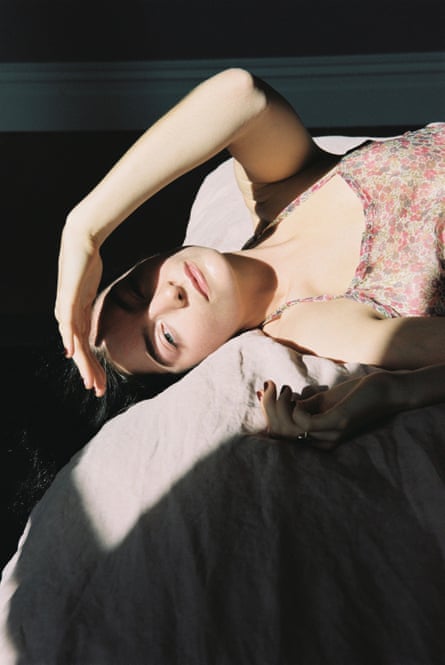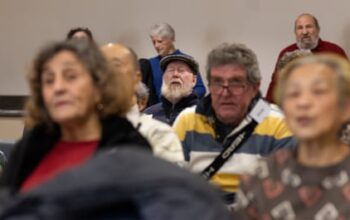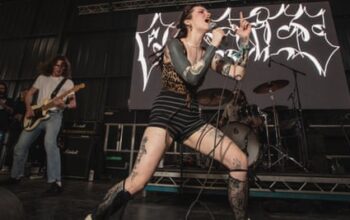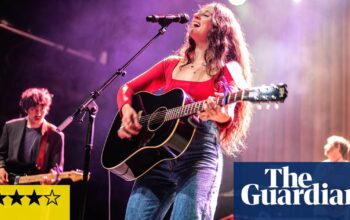Lorde, in case it wasn’t obvious, has made her name on glorification. Ella Yelich-O’Connor was an aristocracy-obsessed 16-year-old when her imperiously cool debut album, 2013’s Pure Heroine, elevated suburban New Zealand adolescence to pop echelons in which those kids had never previously seen themselves. In 2017, Melodrama cast post-breakup hedonism in glittering synths, dramatising one fabulous night on the cusp of adulthood as if it were Greek tragedy.
Her forthcoming third album, Solar Power, has humbler origins, especially for a songwriter who likes describing inspiration as “divine”. The loose, sunny instrumentation – inspired as much by Crosby, Stills & Nash as Nelly Furtado – mirrors a shift within the 24-year-old. “When I got my dog, all of a sudden you’re literally picking up shit, cleaning up vomit and not caring,” she says cheerfully, video-calling from the start of a jet-lag-addled workday in Los Angeles.
Her elegant jewellery and sleeveless black top contrast with her gusto for animal bodily functions. “It’s all in service of this huge amount of love. You feel this shift toward the feral and a relinquishing of the control that would have maybe kept that feral nature at bay.” She loved it. “Because I’ve been the master of my own universe since, like, 16. Which is a very unusual experience.”
More on the dog – the dearly departed Pearl – later. These may seem insalubrious beginnings for one of the year’s most anticipated albums, but if Solar Power glorifies anything, it is life’s natural rhythms: tides, seasons, the evolution of a feeling, or indeed, canine cogitation. Lorde wanted to reflect how she feels at home in Auckland, where she lives in blissful obscurity. There are hardly any paparazzi; once in a blue moon she pops up on MailOnline, buying a rug. In 2018 she deleted all but a few posts from her Instagram and Twitter and abandoned both. Her greatest joy is contemplating the promise of a long summer day: will she garden? Swim? Fish? She rues spending today’s solstice trapped on Zoom; at home, she would have swum at dawn.
The inspiration for the album, according to the artist, was the idea of revealing oneself and embracing playfulness by shedding layers. This is represented in the artwork, where she playfully jumps over the camera and exposes a bikini wedgie. When she first saw the image, she reacted with excitement and coyly gasped while covering her mouth. However, the final result was successful as it captured a sense of innocence, freedom, and wildness.

The uncomplicated lifestyle lessened some of the seriousness she held towards herself. She reflects, “When I was making my debut album, I would have preferred death over using an acoustic guitar. They reminded me of campfires and guys wearing silly hats, which felt very early 2000s to me.” She chuckles heartily. “But now, both in 2004 and 1976, guitar music has become my go-to!”
She was too young to fully appreciate the music of Natalie Imbruglia, Natasha Bedingfield, and All Saints during their initial rise to fame. However, upon revisiting this era, she discovered a sense of optimism in the songs that were often criticized. The lyrics about beaches and outdoor activities were especially captivating to her and she felt they were ready for a comeback. (I’m reminded of the Spice Girls’ song “Viva Forever” and I’m surprised to find out she’s never heard it. I send it to her later and she loves it. “I’m going to spend some time with this.”) She instructed her drummer Matt Chamberlain to play his parts as if he were skateboarding, drawing on a memory that she wanted to capture in her music. Although she cannot skate herself, her memories of watching her friends skate and the blue light from the bowl have stuck with her.
This newfound convenience does not, nevertheless, predict a stale campfire singalong. She and collaborator Jack Antonoff “still meticulously went through every damn aspect! I’m obsessive, my hearing is unmatched. You can’t fool me.”
The main song and first release of Solar Power draws inspiration from the joy of being at the beach, with nods to the carefree vibe of Primal Scream’s Loaded and George Michael’s Freedom 90. Both Bobby Gillespie and George Michael’s estate approved the song. While it may not capture the wild euphoria of Melodrama’s Green Light, it offers more relatable realizations. Some critics found it to be insignificant. Lorde disagrees, stating, “I don’t see Solar Power as a superficial moment. It still holds depth for me, while also being playful and fun.”
Lorde’s album Melodrama was highly praised in 2017. Despite feeling inexperienced, Lorde and Antonoff managed to create the album over a period of two years. While it didn’t achieve the same commercial success as Pure Heroine, Lorde wasn’t too concerned about that. In fact, she stated in 2018 that she didn’t care about the commercial performance of her work. However, her influence in the music industry is still strong as seen in the works of artists like Olivia Rodrigo, Conan Gray, and Holly Humberstone who have incorporated her distinct and recognizable vocal harmonies. Lorde is flattered by this, although she admits she doesn’t listen to much contemporary pop. She jokingly refers to herself as “patient zero” of a “harmony virus.”
I have listened to half of Solar Power. Unless there are major popular songs hidden elsewhere, it is a more personal experience compared to its chaotic predecessor. The focus is on Lorde’s iconic vocals, set to classic pop melodies that evoke the haunting beauty of the Carpenters. Although Lorde still identifies as a pop artist, she is no longer concerned with whether her music will be played on the radio or fit into a traditional pop genre. It will be intriguing to see if this unique sound gains popularity.
She describes Solar Power as happy and optimistic, but I am struck by its melancholy: the songs about fame, the climate crisis, wellness culture, and the passing of time; the heavy self-doubt. Lorde expresses surprise and curiosity when told about the sadness in her music. She mentions the song Stoned at the Nail Salon, which explores themes of uncertainty, loneliness, and doubt. She does not view these emotions as permanent or negative, but rather as a natural part of life. Lorde is comfortable with feelings of uncertainty, fear, and vulnerability during times of transition or limbo.
“In addition, in the song she discusses how all the attractive girls will eventually age and lose their beauty, comparing them to fading roses. This was a realization that occurred relatively recently and was the first time she considered that the seemingly perfect models on Instagram who made her feel inadequate will also experience aging. She reflects with contentment, acknowledging that we are all in the same boat and will eventually have to face the effects of time. She found comfort in contemplating the passing of time, stating that she had reached an age where she could finally think about it. As a child, she never had to consider mortality.”
She states that the album is clearly a result of happiness, though that happiness stems from the recognition of sadness. This leads us to Pearl. In 2018, Lorde was worn out from touring and yearning for consistency, so she made the decision to adopt a dog. “And he would have blonde fur, and that would transport me,” she explains. “And it did. He was the perfect guide on tour.” He would lie under the piano while she familiarized herself with writing on an instrument for the first time. “To experience this energy that was not coming from me was truly impactful,” she says.
Taking care of him allowed her to gain insight into her parents and reflect on her future as a parent. She acknowledges that this experience has made her think about things beyond her own emotions in the moment, stating, “I could have the most terrible day at work, but coming home to someone who is happy to see you is a reminder that you’ve done something right. It’s not just about my performance on the dancefloor.” She adds with humility, “I used to be more concerned about how others would evaluate my performance, but now I am less focused on that.”
Pearl, Lorde’s companion of less than two years, passed away due to ongoing health problems. Lorde reached out to her fans through email to inform them that her new record would be delayed due to the loss, as she was deeply grieving. She has not been back to the park where they used to walk together. While acknowledging the significance of Pearl’s life, Lorde’s immense devastation seemed to also represent a larger sense of loss. She admits, “It was definitely something bigger…it was everything.” However, she hesitates to discuss it further with the journalist. With a kind chuckle, she attempts to describe the impact of grief, stating, “It truly transforms you. I had never experienced it in such a profound way before, and it forces you to question everything. It upends a lot.”
The impact it has had on her will likely be explored further in the next album. “This album is centered on the value of life,” she explains.
In February 2019, she finally achieved her lifelong dream of visiting Antarctica. She described the experience as being in the presence of a powerful, untamed force. While the landscape was undeniably beautiful, there was also an element of fear. She didn’t feel like she belonged in the natural world and instead felt like an outsider. For her, the trip was a spiritual journey. Transitioning from the warm beaches of New Zealand to the harsh, cold environment of Antarctica and back again served as inspiration for her upcoming record.

In her album, Lorde shares that addressing the natural world was both a process of grieving and celebration. Many fans believe that the music video for Solar Power, where Lorde dances on a simple beach with disinterested followers, is a political statement. She wears yellow, possibly representing the sun deceiving unresponsive youth into ignoring warnings about climate change. It could also symbolize indifferent politicians who neglect the issue while the world suffers. Lorde hints that the beach will make more appearances in her videos and unveil its secrets, but she clarifies that her album is not solely focused on climate change. As a pop star, she acknowledges her role in contributing to the giant machine of emissions and admits that there is still much she doesn’t understand.
One scene in the Solar Power music video has been closely examined, where the singer walks past some garbage while looking at the camera. She explains that this is her way of acknowledging the idealistic views that people have about her home country. She adds that New Zealand, like any other place, also has its share of literal and metaphorical trash on its beaches. When asked about Jacinda Ardern, a figure who is highly praised worldwide but also a source of disappointment for young New Zealanders due to her cautiousness, the singer chooses not to comment. She simply states that there are many issues that need to be addressed in her country.
She sought to dispel the notion that she held all the answers. The first track on her album, titled “The Path”, takes place at the 2016 Met Gala. Lorde takes a fork for her mother and watches as “supermodels dance around a pharaoh’s tomb”. She then confesses, “If you’re searching for a saviour, I’m not it.” She acknowledges that it may be an unusual starting point, but she is aware of how society perceives her as a famous figure – almost like a deity – and she wanted to break down that perception.
One song, Fallen Fruit, is a crushed flower-power lament for the spoiled Eden her generation inherited. But that’s the only protest song. She recalls Mark Rylance saying that artists should tell love stories about the climate. “The opposite has been proven not to work,” she says. “I do think these songs are love stories more than anything. But love is complicated.”
The flower-children who are portrayed in the Solar Power music video and the troubled girls mentioned in the album’s lyrics are trying to ease their feelings of emptiness through the use of weed, manicures, and crystals. This idea aligns with a quote that Lorde has on her Instagram bio, taken from Joan Didion’s 1967 essay Slouching Towards Bethlehem, which discusses the concept of dropouts and the use of psychedelics in the Haight-Ashbury neighborhood. At first glance, the quote “a return to innocence – the mysteries of the blood – an itch for the transcendental” may seem like a statement of artistic purpose. However, when put into context, it is actually a psychiatrist’s observation on how romantic movements that arise during times of crisis often lead to authoritarianism.
Could there be potential struggles ahead for those who have turned to alternative options due to lacking traditional support systems? The speaker is hesitant to disclose too many details, but hints at a similar sentiment. They mention reading about past movements of dropping out and communal living, and see similarities to current struggles. The full picture may reveal itself in the future, but it was an exciting and fruitful topic to explore.
During the pandemic, Lorde primarily resided in New Zealand, a country that was not heavily affected by Covid. She admits to not being very aware of the cultural impact of the pandemic. However, she personally feels great and believes that disconnecting from the online world has allowed her to tap into her potential and is a thrilling experience.
She decided to leave social media and transform her phone into a simpler model – she shows me the grayscale screen, believed to reduce constant checking – after coming across Annie Dillard’s quote: “How we spend our days is how we spend our lives.” She repeats it with conviction. “I realized I couldn’t continue like this forever, this couldn’t be all there is.” Social media used to be enjoyable for her. “But I believe it was changing my brain patterns and limiting my thought processes. I was losing my ability to fully explore an idea at my own pace, which felt like losing my freedom at times.” She chuckles, puzzled. “I was extremely addicted. Being able to let go of that has empowered me and sparked my creativity and confidence.”
In an email exchange, I inquire about her concerns regarding losing connections and creating art that addresses intergenerational challenges. She responds by stating that she believes losing touch is actually beneficial for her emotional and creative growth in her 20s. She acknowledges that this privilege is tied to social and economic factors. She also believes that her ability to see the world objectively is crucial for her writing, and this would not be possible if she remained constantly connected online. She attributes the depth and intimacy of her work to setting boundaries in this way.
After reading Jenny Odell’s book, How to Do Nothing, which argues against the pressure to be productive, she was motivated to disconnect from the internet. She believes her new album, Solar Power, will have a similar impact on her fans, helping them refocus their attention. For her, this shift in attention was achieved through taking her dog for walks twice a day in the nearby park, which she found to be a transformative experience.
When Lorde emerged, articulate teenage pop stars who wrote their own songs were few and far between. Now there are dozens in her wake, from Rodrigo to Billie Eilish. Her own precocity has shapeshifted, evident in how she has enforced normality on her life. “I was just at home for years,” she says of Solar Power’s roots. “It would make me feel vulnerable sometimes, feeling that cut off and that irrelevant, so to speak. But it’s also very powerful, and I can understand that as something that is precious.”
Solar Power is out on 20 August
Source: theguardian.com


